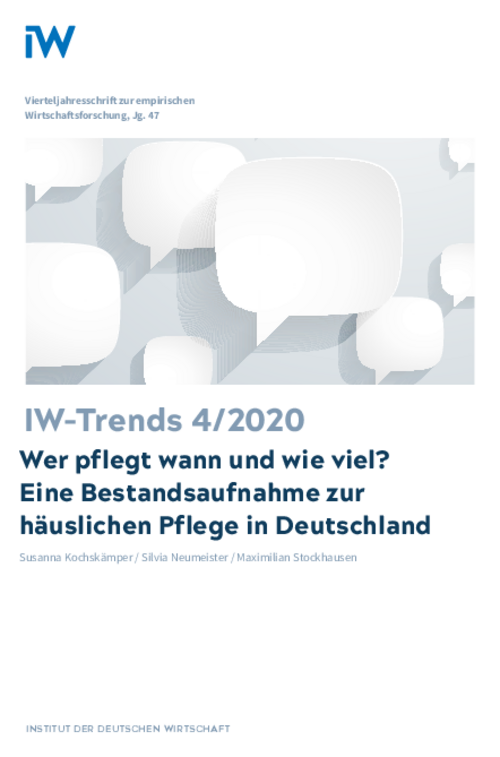German society is ageing and the need for nursing care is increasing. In 2017, just under 5 million people claimed to be providing nursing care in a private setting. An analysis of the data from the Socio-Economic Panel provides a heterogeneous picture of how the home care burden is shared.

Who Nurses When and How Much?: An Inventory of Home Nursing Care in Germany
IW-Trends

German society is ageing and the need for nursing care is increasing. In 2017, just under 5 million people claimed to be providing nursing care in a private setting. An analysis of the data from the Socio-Economic Panel provides a heterogeneous picture of how the home care burden is shared.
Most carers are of working age and the majority are working part-time, though there are also many in fulltime jobs. However, those who are not in paid employment spend significantly longer hours nursing. More women of working age than men are looking after a relative, and on average women also spend more time nursing, although among older cohorts the difference between the sexes is less marked. While the proportion of home carers differs only slightly in relation to net income, it rises significantly with the level of net assets. However, the average number of hours of care provided is in inverse proportion to the level of net income or net assets. As the population ages, it is becoming increasingly important to adapt the conditions that our society and companies provide for home nursing accordingly. If the political objective is to enable those in need of care to remain in the home environment as long as possible, the compatibility of work and family life – and this means taking care not only of children but also of infirm relatives – must be further improved.

Susanna Kochskämper / Silvia Neumeister / Maximilian Stockhausen: Wer pflegt wann und wie viel? Eine Bestandsaufnahme zur häuslichen Pflege in Deutschland
IW-Trends

More on the topic

Expenditures and Revenues in Germany’s Statutory Health Insurance
Almost annually recurring deficits in Germany’s statutory health insurance system have led to a steady rise in the contribution rate, a percentage of earned income.
IW
Changing Germany's Statutory Pension Insurance: An Empirical Study of Popular Aversion to Reforms
The demographic transition is putting the German statutory pension insurance system under enormous pressure to reform. Despite widespread concern, no reform of the adjustment mechanisms incorporated into the pension system meets with the approval of a majority ...
IW